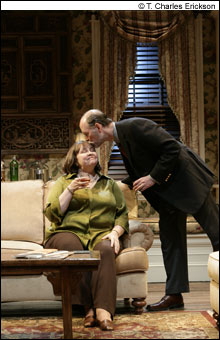Behind the masksTrinity Rep's splendid A Delicate Balance February 27,
2007 3:58:32 PM

COMEDY OF ILL MANNERS: Duclos and Crowe.
|
“Dramedy” has been describing successful American plays more and more frequently in recent decades. That can make for admirable balance, but also has to do with audiences coming to expect a little candy with their medicine. Edward Albee’s A Delicate Balance does things the hard way. It has elements of a drawing room comedy, and yet it is also arguably the most brilliant, stripped-down exemplar of modern despair ever to hit the stage.
Its current Trinity Repertory Company production (through March 25), directed by Kevin Moriarty, accomplishes something rare. While remaining a comedy of ill manners, every scathing interplay allowed to redline the Laff-o-Meter, the disturbing extreme of this Pulitzer Prize-winning existential amalgam is allowed full voice. This magnificent production is a hearty slap on the back that sends you sprawling.
The opening scene is conventional enough. Hyper-articulate Agnes (Janice Duclos) is waxing bemused to husband Tobias (Timothy Crowe) about being afraid of going mad someday, sounding like it would be a relief. We learn that her alcoholic sister Claire (Anne Scurria) lives with them and that Agnes observes Tobias’s attentions toward her sister under a furrowed brow. Also, their grown daughter Julia (Angela Brazil) is working on, or through, her fourth husband. And we are told that their best friends in the world are named Harry (William Damkoehler) and Edna (Cynthia Strickland).
Like pistols gestured to above a mantelpiece, all the aforementioned are set to go off, and some do so in unexpected ways. The most predictable character is Claire, and Scurria plays this comic foil to the hilt. The proudly, vehemently unrepentant drunk plunges sharp comments right and left, her chemical lucidity rendering her the most perceptive person here. Scurria gives her a whiskey-husky voice, like Elizabeth Taylor braying, “I do not bray!” in Who’s Afraid of Virginia Woolf?
Duclos gives us a confidently wifely Agnes who’d make a good dowager empress, pleasantly finessing away intrigues behind the scenes. The actress is a marvelous comedienne, and that ability to control timing and tone leavens the dignified Agnes’s intense purposefulness: in this liquor-lubricated atmosphere, she must hold this family together to hold her very sanity intact.
Daughter Julia gives her formidable challenge. She has run away from that fourth marriage, back to the comfort of her real home, where she can be a willful, hysterical adolescent once again, her default state. Brazil convincingly plays her as a whirling dervish that rests only to catch its breath, a feral child from whom we quickly stop expecting impulse control.
The threat she perceives is quite real. Showing up out of the blue and occupying the bedroom that Julia has always returned to are Harry and Edna, those nominal best friends. Here comes the genius dimension of this play. Instead of Albee having them ask for help after some rational disaster, perhaps a death in the family, they report that, earlier that evening, they simply became terrified of being alone in their home. So they have shown up to move in with their best friends. Damkoehler and Strickland both make the stark implausibility believable through unblinking directness. Their every gaze inquires of Tobias and Agnes, “You aren’t merely fair-weather friends, are you?”
Tobias is the linchpin here, and Crowe provides the necessary steel. This pleasant, independently wealthy man wears his comfort as though it’s armor, even as he flinches when realizing it’s permeable. At the beginning, Crowe keeps him on the brink of jollity, not so much letting a mask slip when things get difficult but rather letting us peer into his flustered turmoil. It’s this performance that makes the production such a powerful experience.
Tobias eventually comes to a realization about the bedrock importance of personal responsibility. This scene could be slouched through, the character going through socially prescribed motions in order to save face. But Crowe shows Tobias to be truly an¬guish¬ed in the lengthy last-scene monologue, modulating up and down through a roller coaster of emotions as he, in effect, blurts a manifesto and means it. He’s still hapless, but he’s heroic.
Sound design by Peter Sasha Hurowitz and lighting design by Deb Sullivan focus us nicely when necessary. The set design by Michael McGarty didn’t convince me — I doubt that upper-crust matriarch Agnes, with her foyer orchids in a Chinese porcelain bowl, would abide living room furniture that’s clunky and less-than-top-shelf.
Trinity Rep’s A Delicate Balance is not to be missed. This production grows into the profoundly moving experience that ambitious theater strives for.
|
 |

|
- In The Edge of Disaster, a security expert warns that the US is not prepared for future disasters
- Never mind its tough-girl alt-porn feminism: SuicideGirls has already moved on to a new generation
- Lesson One: the perils of sharing
- Oral is the new second base, the “mostly” girls keep on kissing girls, and the Bro Job has arrived (but is still not ready for its close-up)
- How one little post-war doughnut shop became synonymous with Boston’s identity
- Few on Deval Patrick's ‘fresh blood’ staff have been seasoned in the State-house hallways
- How one little post-war doughnut shop became synonymous with Boston’s identity
- Who’s looking at you, kid?
- SexyFront
- Last year’s New Times–Village Voice media merger pitted two kinds of journalism against each other. Guess who won?
- The abiding lessons of civil-rights-movement-era journalism
- Veteran New York editor Lance Gould to helm the weekly
|
-
Brown's Pulp Uncovered festival
-
Detritus and Crenca's energetic collaboration
-
Housing crunch
-
The Rhode Island Writers’ Circle Anthology
-
Perishable’s probing Constitutional
-
Viva las ropas viejas
-
2nd Story’s madcap Flea In Her Ear
-
Providence Black Rep’s Black Maria
-
Brews, ballgames, and much more
|
|